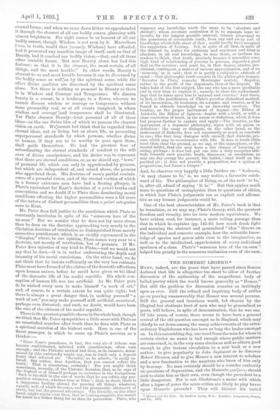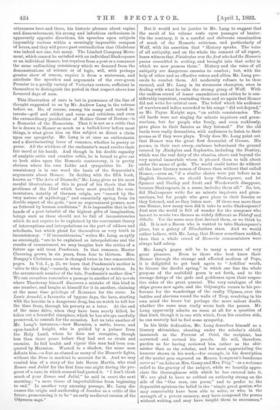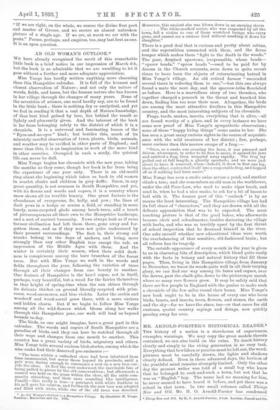THE HOMERIC LEGEND.*
MANY, indeed, are the years that have passed since Seneca declared that life is altogether too short to allow of further discussion of the authorship of the magnificent body of ballad-poetry which the world knows generally as "Homer." But still the problem for discussion remains as invitingly open as ever. Still the refined and inquiring body of critics go on proving unanswerably that Homer was several persons. Still the general and incurious world, led therein by the illogical but obstinate knot of men who may be generalised as poets, will believe, in spite of demonstration, that he was one. Of late years, of course, there seems to have been a general revival of the old question amongst us in England, which may chiefly be set down among the many achievements of the extra- ordinary Englishman who has been so long the leader amongst us. In this astonishing day, one word from the man for whom in certain circles no name is bad enough where public matters are concerned, is, in the very same circles as well as others, good enough to give instant circulation to a new book or a new author ; to give popularity to John Inglesant or to discover Robert Elsmere, and to give Homer a new interest to scholars and a new fascination to the numbers who know of him only by hearsay. No man certainly should be a sounder authority on questions of Separatism, and the Homeric zed/gorreg should seek to claim him as their own, even though the precedent be a. little dangerous. For is not Gladstone's a name with which after a lapse of years the acute critics are likely to play havoe upon Homeric grounds ? They will disinter his varied • Homer and the Epic. By Andrew Lang, M.A. London: Longuntna, Green. ftna 00, 1891,
utterances here and there, his historic phrases about rapine and dismemberment, his strong and infections enthusiasm in apparently opposite directions, his speeches upon subjects impossibly various within a seemingly impossible compass of hours, and they will prove past contradiction that Gladstone was indeed not one, but many. The Limited Company Move- ment, which cannot be satisfied with an individual Shakespeare or an individual Homer, but requires from a poet or a romancer the same unflinching consistency which we demand from the demonstrations of science or of logic, will, with perhaps greater show of reason, require it from a statesman, and attribute the speeches and arguments of the ever-green Premier to a goodly variety of Victorian orators, sufficient in themselves to distinguish the period in that respect above less favoured days of man.
This illustration of ours is bat in pursuance of the line of thought suggested to us by Mr. Andrew Lang in the volume before -us, He, of course, among his many and varied in- terests—golf and cricket and verse and criticism, and even the extraordinary jocularities of Mother Goose of Boston—is a Homerist of the Homerists. That it is not as a critic that he is drawn to Homer so much as a ballad-lover before most things, is what gives him on this subject so direct a claim upon our sympathy. Mr. Lang is at once an enthusiastic and a discriminating lover of romance, whether in poetry or prose. All the wielders of the enchanter's wand receive their fair meed at his hands. And though in his double capacity of analytic critic and creative critic, he is bound to give ear to both sides upon the Homeric controversy, it is pretty obvious where his own faiths and sympathies lie. In- consistency is in one word the basis of the Separatist's arguments about Homer. In dealing with the fifth book, known as "The Acts of Diomede," Mr. Lang gives Us his most careful illustrations of this in proof of his thesis that the problems of the Iliad which have most puzzled the com- mentators, notably of German origin, are "caused by the very nature of mythology," and essentially spring from its double aspect of the gods, "now as supernatural powers, now as fettered by human conditions." It is impossible that in the hands of a poet brimful of the highest gifts of imagination, beings such as these should not be full of inconsistencies which do not require to be explained by the convenient theory of interruptions and interpolations on the part of editors and scholiasts, but which plead for themselves as very truth in inconsistency. "If inconsistencies," writes Mr. Lang, as aptly as amusingly, "are to be explained as interpolations and the results of remaniement, we may imagine how the critics of a future age will treat Pendennis. In that romance, Master Clavering grows, in six years, from four to thirteen. Mrs. Bungay's Christian name is changed twice in two consecutive pages. In Vol. I., p. 25, we learn that Pendennis's mother is 'alive to this day,'—namely, when the history is written. In the seventeenth number of the tale, Pendennie's mother dies." We can ourselves remember a passage in another of his novels where Thackeray himself discovers a mistake of this kind in one number, and laughs at himself for it in another, claiming at the same time privilege of Romance for the error. La _Lewis Arundel, a favourite of bygone days, the hero, starting with the heroine in a dangerous drag, has no watch to tell her the time from, through his poverty as a tutor. At the end of the same drive, when they have been nearly killed, be takes out a beautiful timepiece, which he has always carefully preserved, to consult for the occasion. Let us take another of Mr. Lang's instances,—how Marmion, a noble, brave, and open-handed knight, who is guided by a palmer from the Holy Land, whom he does not recognise, though less than three years before they had met as rivals and enemies. In full health and vigour this man had been con- quered by klarmion. Wasted to a shadow, the same man defeats him,—a feat as absurd as many of the Homeric fights, without the Deus in machind to account for it. And we may remind him of a story of the late Baron Martin, who read Bonze° and Tuliet for the first time one night during the pro-
gress of a case, in which counsel had quoted it. "I don't think much of your Romeo and iuliet," he said in court the next morning; "a mere tissue of improbabilities from beginning to end." In another very amusing passage, Mr. Lang dis- cusses the origin and authorship of Ivanhoe as a critic of the future, pronouncing it to be "an early media3val version of the Odysseus saga." But it would not be justice to Mr. Lang to suggest that the merit of his volume rests upon passages of banter. On the contrary, it is a careful and elaborate examination of much of the Homeric critieiam, and particularly of Wolf, with his assertion that "History speaks. The voice of all antiquity, and on the whole the consent of all report, bears witness that Pisistratus was the first who had the Homeric poems committed to writing, and brought into that order in which we now possess them." History and the voice of all antiquity are dangerous enemies to combat ; but, with the help of other and as effective voices and allies, Mr. Lang pro- ceeds to combat them. All modernity refuses to be thus coerced, and Mr. Lang is its strenuous champion, even in dealing with what he calls the strong grasp of Wolf. With the endless crowd of lesser emendators and critics he is con- siderably impatient, reminding them and us again that Homer did not write for critical ears. The belief which his audience of warriors and ladies accorded to his songs "did not depend," as Mr. Payne Knight says, "on subtle consistencies. The old bards were not singing for minute inquirers and gram- marians, but for people who freely, and even recklessly, gave place to their fancies as they listened." For the old bards were really dramatists, with audiences to listen to their poems as if they were plays. Truly does Mr. Lang point out that Homer was the great first dramatist of Greece. His poems, in their vast sweep, embrace beforehand the ground covered by 2Esehylus and Sophoeles, including the Destiny, which was the real deity of the classics, above and beyond the very mortal immortals whom it pleased them to talk about under the name of gods. The world could better do without all the later literary names of Greece than without that called Homer,—even as, "if a similar choice were put before us in English literature, we should keep Shakespeare, and let Spencer and Shelley and Scott and Wordsworth disappear, because Shakespeare, in a sense, includes them all." So, too, did Shakespeare write for no minute inquirers and gram- marians, but for people who gave place to their fancies as they listened, and as they listen now. If there was more than one Homer, how many men did it take to write Shakespeare? Just now the world is full of wonder for the composer who has set to music two themes so widely different as Falstaff and Othello. Yet the same man first devised them, or we think he did. It is not a Bacon who is wanted to take Shakespeare's place, but a galaxy of Elizabethan stars. And we would rather believe, with Mr. Lang, that Homer sometimes nodded, than that a whole crowd of Homeric commentators were always half asleep.
Mr. Lang'e pages will be to many a source of very great pleasure. Even to those who best know their Homer through the strange and affected medium of Pope, it is delightful to get back again to "Achilles' wrath, to Greece the direful spring," in which one line the whole purpose of the multifold poem is set forth, and to the strange doings of the gods and goddesses upon their respeo- tive sides of the great quarrel. The very catalogue of the ships grows new again, and the Odysseyite recurs to his pre- ference for the wanderings of the crafty Ulysses, over the battles and alarums round the walls of Troy, revolving in his own mind the lesser but perhaps the more salient doubt, whether the same man really wrote both the poems. Mr, Lang apparently admits no room at all for a question of that kind, though it is one with which, from his creative side, he can scarcely fail to feel some sympathy.
In his little dedication, Mr. Lang describes himself as a literary skirmisher, shooting under the scholar's shield, inasmuch as the Provost of Oriel, the recipient, has corrected ' and revised his proofs. He will, therefore, pardon us for having reviewed him rather as the skir- misher than as the scholar, and for most appreciating the humour shown in his work,—for example, in his description of the quaint gem engraved on Messrs. Longman's handsome cover as " an Ach sun Mrs. Gamp and Mrs. Prig,"—as a welcome relief to the gravity of the subject, while we heartily appre- ciate the thoroughness with which he has entered into it.
We are glad to have so critical an authority strong on the side of the " One man, one poem," and to prefer to the Separatist opinions the belief in the single great genius, who may conceivably have been able to write, or who, in the strength of a potent memory, may have composed the poems without writing, and may have taught them to successors." "If we are right, on the whole, we rescue the divine first poet and master of Greece, and we secure an almost unbroken picture of a single age. If we err, at worst we err with the poets." Poems, perhaps, and empires, too, may last best as one. It is an open question.




































 Previous page
Previous page